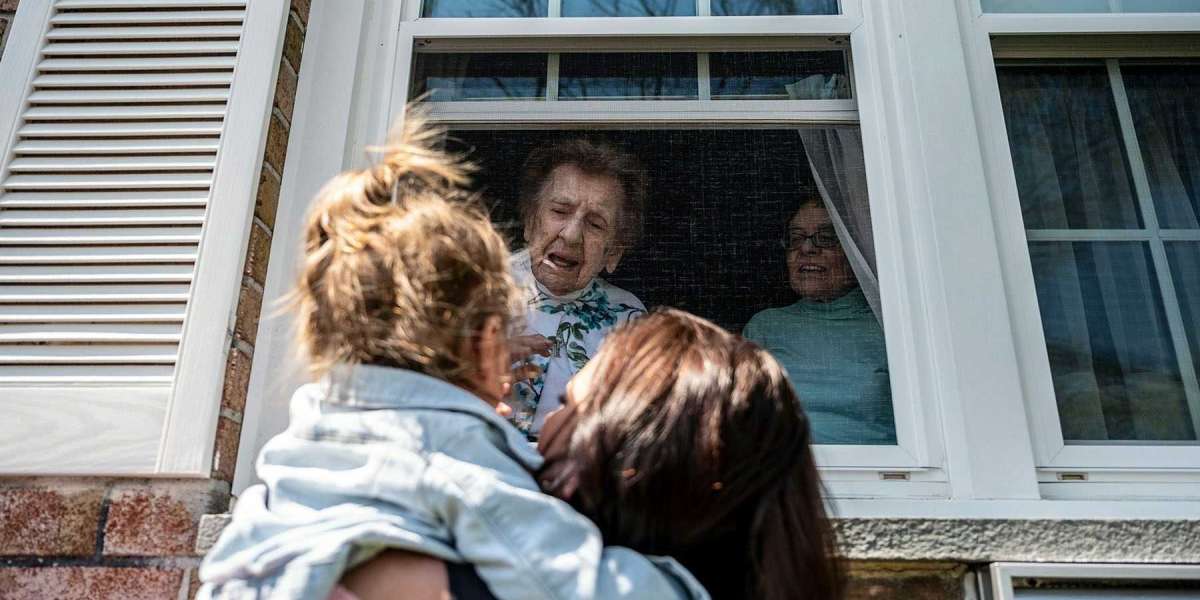In this third year of COVID-19, with infections of the extremely contagious omicron strain on the rise, the onus of staying safe and protected has rested on some of the most vulnerable people on the planet. Even while early reports show that symptoms for omicron instances may be less, it can still be problematic for elderly persons who are more vulnerable to the virus.
While immunizations and boosters have made it possible for many individuals to travel more freely, elders and those who care for them have had to keep on the lookout for diseases. What actions should elders and carers, both of whom are disproportionately female, do in a different way? Is it necessary for people to cut back on activities such as going food shopping or meeting their friends? Will services be suspended once more?
The 19th spoke with a wide range of specialists about what older people and family caregivers should know about the risk that omicron poses to elders, as well as recommended practices for keeping loved ones safe in their homes and communities.
Is there anything we can tell you regarding the danger and severity of omicron in seniors?
Older adults who have been vaccinated have much better outcomes than older adults who have not been immunized, but the vaccination does not make people bulletproof. COVID- According to the Centers for Disease Control and Prevention, the number 19 continues to pose a threat to older persons, who are at increased risk of severe illness and death.
"The effectiveness of vaccines is really high. In general, however, older persons tend to be less effective than younger adults when it comes to immunizations of any kind. It's because their immune systems aren't as effective in producing antibodies," said Sheila Moloney, a professor of nursing at Quinnipiac University and a fellow of the Gerontological Society of America.
The director of the geriatrics fellowship program at NYU Langone Health, Dr. Nina Blachman, noted that while immunizations are still the most efficient strategy to protect our elderly, they are still at a higher risk of developing severe COVID.
According to the White House, two out of every three eligible seniors have received a booster shot, which Blachman advises all older adults to do as soon as possible. In the meantime, vaccine regulations for professional caregivers — the professionals who care for many elders — have been blocked, and many of those who should have been vaccinated have been overlooked.
Moloney emphasized the necessity of carers getting vaccinated and having their immunity increased, saying that it "adds an extra layer of protection for older persons."
Is it safe to engage in normal activities? What exactly is unusual about omicron?
Seniors and other high-risk populations may wish to revert to more strict safety precautions in the future. Experts agreed that elderly and carers may want to limit their indoor activities while the virus is spreading widely in the community at this time. Blachman suggested that activities such as mall walking be swapped out for outdoor walks or visits to a park instead.
"In some ways, we're going back in time to some of the recommendations that were made at the beginning of the outbreak," said Dr. Jennifer Wolff, a professor of health policy and management at the Johns Hopkins Bloomberg School of Public Health. "We're going back in time to some of the recommendations that were made at the beginning of the outbreak."
A number of experts emphasized the necessity of using masks that are firmly fitted and of excellent quality in situations when an older person may come into touch with a big number of other persons. As long as the older person is wearing a tightly fitted mask, such as a N95, it may be safe for them to go grocery shopping, according to Blachman.
Depending on the amount of older individuals and caregivers in their communities, older adults and caregivers may also prefer to postpone family gatherings and trips. Transmission levels are particularly high right now, owing to holiday travel as well as omicron, and they are expected to decline in the next weeks and months. Moloney's mother-in-law, for example, has been attending outdoor events, but Moloney has advised her mother-in-law to stay at home for the time being to avoid conflict with her husband.
Was there any impact if elder centers and day programs were to close?
Many senior centers and day programs have already closed their doors as a result of the widespread transmission of the coronavirus and a scarcity of qualified staff. While the closures are not expected to last as long as they did during the early stages of the epidemic, the absence of support can nevertheless generate anxiety among older people and their caretakers.
The lion's share of care delivery and help for non-medically directed chores is provided by family and other unpaid caregivers, according to Wolff.
Even when a senior's regular caretakers are unavailable, other family members and neighbors can provide crucial assistance. However, Bob Stephens, vice president of caregiving and health programs at the American Association of Retired Persons (AARP), recommends creating caregiving plans – documents that outline contingencies in the event that a program or professional caregiver is unavailable, or in the event that a primary caregiver becomes ill. AARP provides planning aids to assist family caregivers in preparing for their responsibilities.
He also recommended that family caregivers who are employed full-time seek for employee benefits to supplement their income. In addition to providing back-up child care, many firms also provide back-up elder care as an employee benefit.
In accordance with the amount of insurance provided by your company, "they may grant you a set number of hours throughout the year where you can receive that backup care," he explained.
What measures may be taken to keep caregivers from becoming burned out?
Caregiver burnout is a significant concern that they confront when they take on an ever-increasing share of the caring responsibilities. "COVID is only compounding the difficulties of caregiving," Wolff stated.
According to Stephens, who spoke to The 19th, AARP research has found that caregivers' stress levels have increased as a result of the pandemic. There are systemic factors at play: the health-care infrastructure has been neglected for decades, and COVID has simply exacerbated the situation.
The importance of acknowledging that this is a difficult period is essential.... Coping methods and life circumstances will be different for each individual, as will the conditions in which they will be used. Just remember to keep your expectations in check and to be patient with one another. Let us be patient with ourselves," Wolff said in an interview with The 19th.
Stephens proposes that family carers seek out peer help. While she believes that in-person support groups are not recommended at this time, she does acknowledge that online assistance is available.
"Family caregivers greatly cherish the opportunity to speak with others who have been in their shoes. According to Stephens, "the capacity to have a conversation with someone who understands exactly what you're talking about is quite crucial." The American Association of Retired Persons (AARP) has a Facebook page for this purpose. Anyone is welcome to participate, but "we keep it private in order to maintain a safe atmosphere," Stephens explained.
How can caregivers keep seniors safe from false information about vaccines?
In addition to the virus itself, there is a looming problem of misinformation to consider. Older persons are more susceptible to receiving incorrect information about COVID-19 and vaccination.
As part of its partnership with the News Literacy Project, AARP has developed webinars to help educate elders and caregivers on how to determine the veracity of online information sources. A webinar on how to have effective dialogues with loved ones about disinformation was also held by the organization.
"We want to make sure that people have a lot of information that is easily accessible," Stephens explained.
As a means of combating disinformation, Wolff suggests that seniors seek counsel from health-care experts with whom they have a long-standing relationship and whom they have confidence. In contrast to hearing from their children or grandkids, they may be more receptive to hearing from someone they believe to be a trustworthy authority figure in their lives. Moreover, she proposes that the matter be approached from a caring viewpoint rather than a moralistic standpoint.
"Try expressing something like 'I genuinely care about you.'" "I just want to make sure you're safe," she explained.



